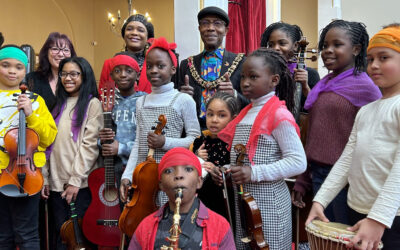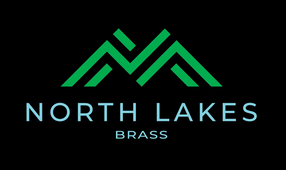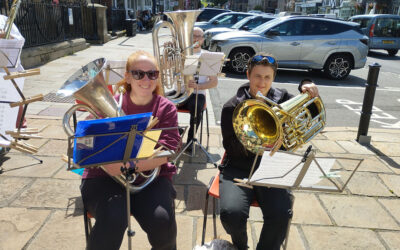Brass at the Castle was an event in which Drum and Brass actively sought to collaborate and bring together brass bands across Cumbria. It took two years to plan and almost failed due to the difficulties in finding a date and location that would work for all bands.
On July 14th and 15th 2024, however, 11 bands travelled to Lowther Castle Park and Gardens in Eden, Cumbria, on a very wet weekend, to perform, connect and celebrate brass playing, and to share our passion for brass with new audiences.
Acknowledging the support provided by funds from Arts Council England and the Westmorland and Furness Council, as well as sponsorship from 16 local businesses, this report presents the project processes, outputs and feedback and concludes with an account of the outcomes and legacy
Elevating Brass Heritage
In the lead up to the event we captured footage that points to ways in which brass bands can potentially engage with communities at a broader level including by going into schools, community organisations and working with individuals with special needs, with refugee and autism groups and thereby encouraging a diverse range of individuals to participate. Band players felt, after the event, that this cultural medium has a strong future in the region.
The Cumbria Brass Network website has connected prospective players with existing bands and with one another. It has provided a focus for bands to communicate their messages and explore their identity.
Video and sound recordings have provided valuable documentation and showcased the artistic achievements of brass bands in Cumbria and of the event itself. Audiences were surprised and impressed by the musical expertise of the bands, and the event definitely kindled interest in people in playing with bands, as conversations with visitors evidenced.
Promoting Community Cohesion
Uniting brass bands from diverse backgrounds, Brass at the Castle aimed to foster a spirit of collaboration rather than competition. By providing a stage for bands to showcase their unique identities, we aimed to strengthen the bonds among musicians and establish the foundation for the Cumbria Brass Network. In feedback, players and secretaries expressed appreciation for this approach. Our network meetings have attracted participants and future sessions will hopefully attract more, as confidence and revenue starts to flow into the sector. The happy timing of the event alongside Theatre By The Lake’s staging of Brassed Off, featuring many of the players in the event, can only help this optimism.
Future meetings are planned to address band identity and audience as these are central to the future of brass bands and will highlight the growing diversity within the sector as different approaches are shared and acknowledged. Bands will be encouraged to share their particular strengths in e.g. masterclasses or short talks.
Improving Access to Instrumental Music-Making
Drum and Brass is committed to breaking down barriers to participation, for instance for older/disabled individuals facing transportation challenges. The festival has enabled us to develop connections with bands in West Cumbria, particularly in Millom where we built links around the Cumbria Youth Brass Band with the Holborne Hill Royal Brass Band Juniors and their able conductor Cath Clarke, who conducted the youth band at the festival. We look forward to continuing to work with bands on the west coast with three dates for the CYBB in 24/25 (Millom, Egremont and Cockermouth). This project has also allowed us to reach individuals who have felt excluded from traditional banding activities, developing new band-room delivery approaches and community projects that have promoted understanding within the band world of the challenges faced by some but also open doors for new players.
We carried out an important piece of work this year with the Penrith and Eden Refugee Network (PERN) which exposed the complex power dynamics involved in “seeking to diversify”.
Brass bands have a recognised white demographic across the UK and Europe. Drum and Brass director Davina Vencatisami calls brass band music “indigenous white music”. There is no logical reason why this should be so however, and there are many bands across the world with no white players.
Working with the PERN outreach worker, conversations and an initial attempt to bring players together (Bring your Own Music) revealed the many ways in which white privilege asserts itself and patronises non-white voices. This could be one reason why non-white players feel excluded. The project lead wrote a blog about Bring your Own Music, an event which threatened to sever relations between Drum and Brass and PERN. However, after much discussion, we invited 32 members of PERN to the festival. We prepared a timetable which centred the voices of the group, with a dedicated brass workshop for the young people. There was a spontaneous move to bring young players and their families onto the stage where they performed together with other beginner brass players in what was the most joyous, audience-friendly set of the event. It was the perfect end to the festival. It exemplified the positive changes that can transform brass bands and truly galvanise the sector.
The lesson learnt here is that there are ways of sharing spaces that take the spotlight off individuals and onto the joy that sharing music can bring. This collective enjoyment exists in the spaces between us and serves to connect and unify both musicians and audiences.
This lesson will shape all future events and had a strong impact on those present.
Facebook post about the event by PERN.
Re-energising Youth Engagement
Recognising the importance of youth involvement, we launched an area youth band through this event. The Cumbria Youth Brass Band has met 6 times over the year in different locations in Cumbria. We saw steady attendance of 14-16. The group was very mixed in age group and experience which led to some unhappiness from musical directors who had been hoping for a more advanced group. Player ages ranged from 9-14. Some were very inexperienced while others were very able but they all got on together and really loved the band.
Each session was hosted and led by a different band musical director. We then collaborated to create a setlist for the band. The young players performed for the first time at the festival opening, having gained new friendships and new confidence. Player interviews and consultations have laid the groundwork for active youth representation which has helped to shape the group. As we move into the second year, we can be much clearer about the roles and expectations of participants, but also about the reasons why, having gathered evidence from the players themselves about what they want and enjoy.
Rural connectivity
The event brought bands from all corners of Cumbria together. Players and audiences enjoyed the relaxed approach. The weather was appalling but there was a sense that “this is Cumbria” that we all shared and accepted. Transport was an issue for anyone who did not drive. PERN came to the rescue, hiring a community minibus to bring their members and some band players.
The bands participating in Brass at the Castle were encouraged to play pieces which represent their unique identities and which foster a sense of pride and cultural representation. The original plan for place-based repertoire revealed a dearth of options however, and there is huge potential for new works that reflect the diverse landscapes and communities of Cumbria which might inform future creative projects.
Quantitative metrics:
There have been 14 Cumbria Brass Network meetings to date with an average 4 attendees.
An event photoshoot at Lowther Castle attracted 59 attendees from different bands
The event itself featured over 300 players from 11 bands.
294 tickets were booked for the event via Eventbrite (an expensive but effective platform) and Try Booking (which multiplied all orders by 10, resulting in much extra admin).
17 families (32 in total adults and children) came with Penrith and Eden Refugee Network.
17 local businesses advertised in the brochure and paid for the printing
3 media interviews (BBC Radio Cumbria x 2 and ITV Border)
Passing audience numbers were low because of the weather. Lowther Castle said this was a national trend.
Ratings out of 10 for the event from 21 survey respondents:
How would you rate the communications before the event? 8.4
How was the organisation on the day? 8.2
Cumbria Youth Brass Band – we used OSM and Eventbrite to track attendance.
There were 6 meetings, each attended by 14-16 players, white British, aged 9 – 18.
Formation of new bands/reformation of existing bands
Over the year, Drum and Brass supported 3 local brass bands by forming small groups in different locations. These have been very successful in convincing people of all ages to pick up an instrument and learn. Overall this year we have seen at least 40 beginner players each week. 10 have gone on to join existing brass bands in Appleby and Kirkby Stephen after learning with our groups.
Throughout the year we have seen bands using social media more actively to promote their bands in different ways. This is bringing a different kind of competition to our sector, which depends more on audience engagement and uses the digital technology available to us more effectively..
Feedback
We encouraged feedback throughout the project via regular meetings, targeted surveys, recorded interviews and social media groups.
This is a comment from Clive Barnard of Cockermouth Mechanics referring to the Photoshoot day in March:
“Great event today despite the weather – you’ve done fantastically to enthuse and motivate us all!
Looking forward to the summer weekend “
We want the Cumbria Youth Brass Band players to be involved in shaping the group and have started by using polls and interviews:
Cumbria Brass Network meetings were a chance for bands to discuss and reflect on issues and arrangements
There have been 14 Cumbria Brass Network meetings to date with an average 4 attendees.
Attendees agreed to the website aims to support, promote and elevate bands.
Several trends emerged:
“Training bands are mixed age” (intergenerational) and feedback from the youth band players is that young players want to meet with players their own age
“Bands share players and this is supportive inter-band cooperation” although it also reflects an overall lack of players. Recruitment is always an issue.
“Bands need to know their audiences” when selecting repertoire. The festival also shows a gap between band expectations of a band performance and audience enjoyment. Audiences were wowed by virtuosic performances but got much more engaged with the more lively interactive sets.
The Cumbria Brass Network is seen as potentially a useful platform.
Currently it is viewed with more interest than engagement by bands. This is understandable as it is an unknown quantity so far and band members are time-poor.
However 81 % of survey respondents say yes to network membership and 30% of 272 contacts opened the last newsletter with 6 click-throughs. Since the start of the project we have observed (possibly confirmation bias) that bands are posting more on Facebook. Reposting to the Cumbria Brass Facebook page (80 members across the UK) reaches a broader audience who are not all band players, which is important. It also gives bands a platform to discuss ideas and ask questions that are relevant.
Post-it note feedback by visitors to the event
Our video team interviewed participants, community members and stakeholders at Brass at the Castle
Appreciation of the sense of community that comes from playing with a band comes across loud and clear from all our interviews. Whatever level of playing, people relish playing together and doing all that is needed to create the event and make it a success. Those interviewed said it was a wonderful day where everyone pitched in.
BATC-INTERVIEW-CLARINET-PLAYER.MOV
Website blogs
We invited participants/stakeholders to write a blog about the event. We have published these on our website. This one is from our digital assistant (originally a beginner cornet player who joined one of our bands in 2023 and who has revealed strong digital skills)
Challenges, management and flexibility
We were helped a great deal by Beth Lambert and Helen Minshall at Brass Bands England, who provided support with marketing and funding, advice on event management and encouragement when hard decisions had to be made.
This was a new network and Drum and Brass was/is still an unknown quantity. Bands liked the idea of a festival but agreeing a date took a year and even then there were clashes which meant that some bands could not take part.
The experiences of this pilot event, however, have given us a great basis on which to plan future events. Drum and Brass stuff and volunteers are far more able to suggest appropriate dates and venues, and foresee the challenges and benefits of such choices.
The Lowther Castle venue was seen as a great venue initially, but was less popular after the event according to feedback. The awful weather and the location far away from the cafe were disadvantages. The equipment required to set up an outdoor festival: marquees, gazebos, chairs for audiences, band members etc, parking arrangements, instrument storage and changing areas were all management challenges, especially with wet weather.
We learnt lessons (and crucially built partnerships) that will help smooth the way next time.
The alignment of so many different projects (the network, the youth band and the festival) involved a great deal of communications and time-critical administration. We benefited from a highly-skilled digital marketing team – Olha Allieva (member of PERN), Raven Taylor (a walk-in to one of our beginner bands) and the generous time of volunteer Liz Watson (ex London financier). All three are new contacts resulting from the ACE funding and who are now central to our Cumbrian operation.
The budget was appropriate for the event, with additional expenses (primarily administration time) being compensated for by income from other funds (Westmorland and Furness Council and local business sponsorship). Avoiding tickets meant that new audiences could be reached. Taking the event to a venue with more footfall would increase this impact and we have had indications (funding and feedback) that local and regional councils are supportive of the Brass Festival initiative.
Outcomes:
Volunteer power
The heavy lifting of the event succeeded largely thanks to the coming together of a number of teams of volunteers, with whom Drum and Brass have built partnerships.. One such team is Churches Together, who helped us put up and take down the marquees and with whom we have developed a close partnership which includes shared events throughout the year and valuable conversations about community engagement. Another is the Kirkby Stephen Silver Band (KSSB) and particularly members of the Adult Beginners Band, which is a partnership project run by Drum and Brass with KSSB. These two teams promoted the event (e.g. getting local business sponsorship for the brochures), filled in gaps in the programme due to bands dropping out and helped to set up and take down the event equipment. Volunteers gave us the flexibility to manage changes such as one band dropping out the day before because of COVID, the venue providing half as many chairs as promised and the need to distribute flyers across the county.
We benefitted also from the loan of a drum kit and a PA by Blue Jam, a marquee from a local band, refreshments made and donated by talented bakers and great support and promotion by local media including two radio interviews. Drum and Brass has been made to feel welcome and valued in this region and we are looking forward to developing our partnerships.
The Cumbria Youth Brass Band is established and will involve even more bands and young people in Cockermouth, Penrith, Millom, Keswick, Egremont in 2024-25.
Cumbria Brass Network: 4 meetings have been planned for the year and the network has a dedicated web page.
There are already talks happening for the next Brass Band event, as demonstrated at the final project meeting.. There is also a call for more involvement of young people which we will tie in with the schools outreach work that Drum and Brass does with schools (our BAND! Programme has reached 10+ primary schools in Eden). Opening the event out to additional attractions for families means a lot of extra work that is beyond current Drum and Brass capacity at present but there is scope to partner with other oganisations such as My Community Penrith,who have a good track record for such events..
With our actively inclusive approach we have broadened the demographic of brass players and our groups have developed the confidence and sense of identity to initiate their own community projects, such as “Brass in the Nursery”.
Kiss Brass is a new group of women including disabled women. The players are sharing music with Jilly Jarman’s Street Beats drum and horns group in order to explore playing by ear, diversifying instruments and experiencing a more embodied music-making.
Appleby Beginner Brass is moving to a new community venue by invitation after a staff member visited the event.
Conclusion
This event was the largest of its kind that Drum and Brass has tackled in Cumbria but benefited from what we learned at our “Doing Music Differently” conference in 2021. Planning began earlier and we recognised the value of, and need to care for volunteers.
Working with many new contacts in the brass band sector, as well as the long distances between bands, brought challenges of logistics, management of expectations and occasionally differences of opinion which required a sensitive approach, and clear and regular communication.
The improvements to our overall communications strategy has impacted Drum and Brass as a whole and our digital reach is improving dramatically (e.g. Google reach is 48% up month on month) as a direct result of developing our event bookings and band management processes.
.
Overall the event was a big success with bands and audiences appreciating the different slant and focus on audience engagement. There is an enthusiasm to repeat the event next year and support for the emerging Cumbria Youth Brass Band (CYBB) and the Cumbria Brass Network.

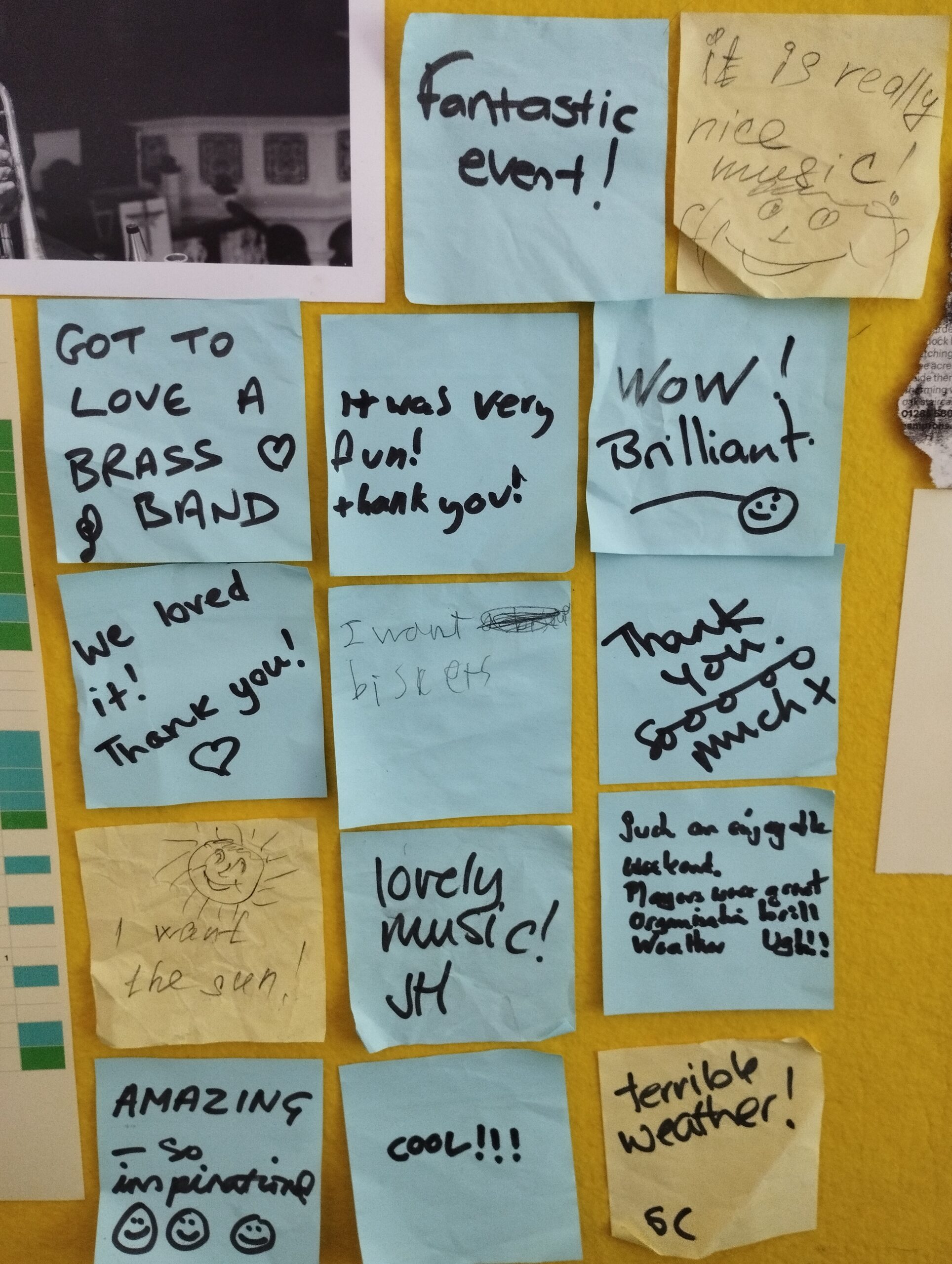
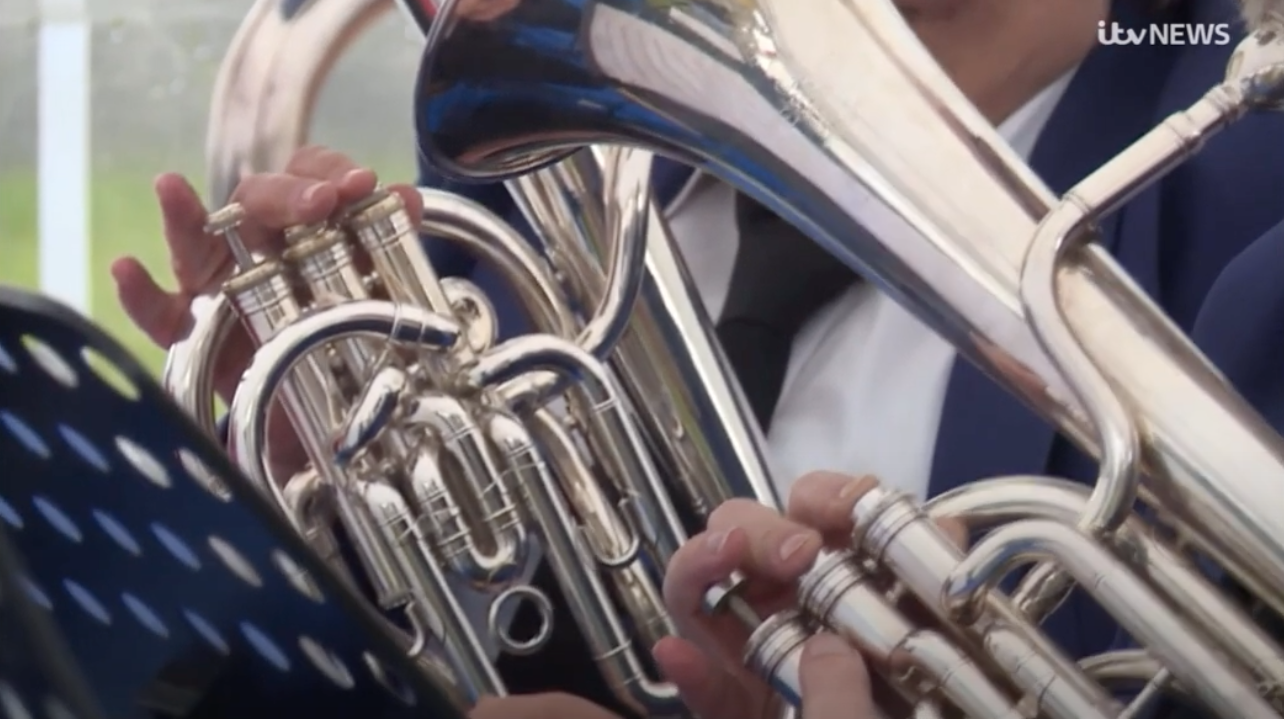
Donate Our Programs
Our Blog
No Bars Orchestra
It started as a celebration of the 70th birthday of Geoff Forse who has managed the Woodgate Resources Centre for over 30 years, many of them as a volunteer. He has ensured that people of all ages have had access to music lessons - learning a range of instruments:...
North Lakes Brass
Main contact: John Miller Email: Johnnybass@btinternet.com Tel: 07739 173798 Address: The Derwent Club, Keswick Times: Wednesday 7:30pm Who is the band for? Adults and advanced players About the band: Fun and focused competition brass band moving up through the...
“Me and Brass Bands”
Guided conversation at the Kirkby Stephen Silver Band Brass Weekender 2nd August 2025 By Julie Hoggarth The Local Heroes group spent a day with Tabby Kerwin’s PERFORM for Brass Bands programme. It was so useful to think about the emotional aspects of playing, that...
Brass For All Programme 2025-2026
The 2025-2026 Cumbria Brass Network Programme features more workshops and more speakers. Check out the meeting topics here and sign up

